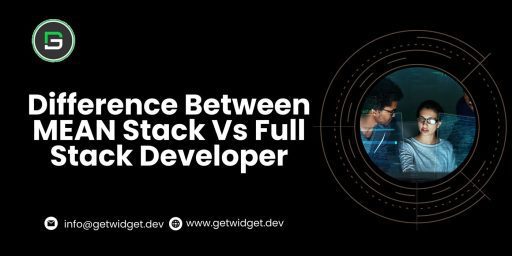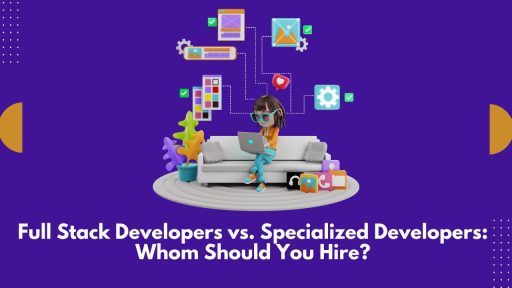In today’s rapidly evolving technological landscape, the role of full stack developers has become increasingly crucial. These versatile professionals possess a diverse skill set that allows them to tackle various aspects of software development, making them indispensable assets to tech teams across industries.
Definition of a Full Stack Developer
A full stack developer is a multifaceted professional who is proficient in both front-end and back-end technologies, as well as various other aspects of software development. They are adept at working with databases, servers, systems engineering, and client-side user interfaces, exhibiting a comprehensive understanding of the entire software development process.
Importance of Full Stack Developers in Today’s Tech Industry
The tech industry’s rapid pace demands agility and adaptability, and full stack developers embody these qualities. Their ability to navigate the entire development stack enables them to contribute to projects at various stages, from conceptualization to implementation and maintenance. As a result, they play a pivotal role in driving innovation, streamlining development processes, and delivering high-quality, end-to-end solutions.
In the subsequent sections of this blog, we’ll delve deeper into the specific skills of full stack developers, the advantages and challenges of hiring them, as well as scenarios where their expertise proves invaluable. By gaining a comprehensive understanding of the value they bring to the table, businesses and tech enthusiasts alike can make informed decisions about leveraging the expertise of full stack developers.
Skills of a Full Stack Developer Here’s an outline of the skills of a full stack developer, covering front-end development, back-end development, databases, version control systems, and APIs:
Front-end Development Skills
- Proficiency in HTML, CSS, and JavaScript
- Knowledge of front-end frameworks such as React, Angular, or Vue.js
- Ability to create responsive and user-friendly interfaces
- Understanding of cross-browser compatibility and web performance optimization
- Experience with design principles and UX/UX concepts
Back-end Development Skills
- Mastery of server-side languages like Node.js, Python, Ruby, or Java
- Expertise in handling server and database interactions
- Implementation of security measures and data protection protocols
- Knowledge of server management and deployment processes
- Familiarity with microservices architecture and serverless computing
Knowledge of Databases
- Proficiency in SQL and NoSQL databases such as MySQL, PostgreSQL, MongoDB, or Firebase
- Ability to design and optimize database schemas
- Understanding of data modeling and query optimization
- Experience with database administration and maintenance
Understanding of Version Control Systems
- Proficiency in Git for version control and collaboration
- Knowledge of branching strategies and merging best practices
- Ability to resolve conflicts and manage code repositories effectively
- Familiarity with platforms like GitHub, GitLab, or Bitbucket for project management and code hosting
Ability to Work with APIs
- Experience in integrating third-party APIs for data exchange and functionality enhancement
- Proficiency in creating RESTful or GraphQL APIs
- Understanding of authentication and authorization mechanisms for API security
- Knowledge of API documentation and testing practices
- Ability to design and develop custom APIs for internal or external use
By possessing a comprehensive skill set that encompasses both front-end and back-end development, as well as proficiency in database management, version control, and API integration, full stack developers are well-equipped to contribute to diverse aspects of software development projects.
This detailed overview of their skills will enable businesses and individuals to appreciate the breadth of expertise that full stack developers bring to the table, making informed decisions about leveraging their capabilities in various projects and initiatives.
Also Read: Frontend vs. Backend – Which One Should You Choose
Advantages of Hiring a Full Stack Developer Here’s an outline of the advantages of hiring a full stack developer, covering their versatility, cost-effectiveness, communication, problem-solving, and project management capabilities:
Versatility and Adaptability
- Ability to work on both front-end and back-end development, reducing the need for multiple specialized developers
- Capacity to seamlessly transition between different project phases, from conceptualization to deployment and maintenance
- Versatility to contribute to various technologies and frameworks, adapting to evolving project requirements
Cost-effectiveness for Small to Mid-sized Projects
- Elimination of the need to hire separate front-end and back-end developers, reducing staffing costs
- Efficient utilization of resources, as a single full stack developer can handle multiple aspects of a project
- Streamlined development process, leading to potential cost and time savings for small to mid-sized projects
Also Read: Frontend vs Backend -Understanding the Difference Between Front-End and Back-End Development
Streamlined Communication and Collaboration
- Clear understanding of the entire development stack, facilitating effective communication with cross-functional teams
- Ability to bridge the gap between front-end and back-end teams, ensuring cohesive collaboration
- Reduced potential for miscommunication and discrepancies between different development phases
Faster Problem-solving and Troubleshooting
- Comprehensive understanding of the entire software development lifecycle, enabling quick identification and resolution of issues
- Capacity to address both technical and functional challenges across the development stack
- Streamlined debugging and optimization processes, leading to faster turnaround times for issue resolution
Overall Project Management and Coordination
- Capability to oversee multiple aspects of a project, from architectural design to deployment
- Reduced dependency on multiple specialized roles, enhancing project autonomy
- Holistic approach to project management, leading to cohesive coordination and efficient task prioritization
By leveraging the versatility, cost-effectiveness, communication skills, problem-solving abilities, and project management capabilities of full stack developers, businesses can benefit from streamlined development processes, optimized resource utilization, and enhanced agility in addressing project requirements.
This comprehensive overview of the advantages of hiring full stack developers will provide valuable insights to businesses and project stakeholders, enabling them to make informed decisions about integrating these professionals into their development teams.
Challenges of Hiring a Full Stack DeveloperHere’s an outline of the challenges associated with hiring a full stack developer, covering the potential for burnout, depth of expertise in specific technologies, and limited bandwidth for large-scale projects:
Potential for Burnout
- Risk of overburdening the full stack developer with a wide range of responsibilities, leading to burnout and decreased productivity
- Balancing front-end and back-end development tasks, as well as other project-related duties, may contribute to high levels of stress
- Continuous context switching between different technologies and project phases can impact the developer’s mental and physical well-being
Depth of Expertise in Specific Technologies
- Balancing the need for breadth of knowledge across the development stack with the depth of expertise in specific technologies or frameworks
- Challenges in achieving mastery in specialized areas, such as advanced front-end frameworks or complex back-end architectures
- Potential limitations in addressing highly specialized or niche requirements due to the broad scope of responsibilities
Limited Bandwidth for Large-scale Projects
- Capacity constraints when handling extensive, enterprise-level projects that require dedicated specialized roles
- Challenges in managing the workload and complexity of large-scale systems, including scalability, performance optimization, and security considerations
- Potential need to augment the development team with specialized resources for specific aspects of the project
By acknowledging and addressing these challenges associated with hiring full stack developers, businesses can proactively implement strategies to mitigate burnout risks, foster continuous skill development, and ensure that the scope of projects aligns with the capabilities and bandwidth of the full stack developers. This awareness will enable stakeholders to make informed decisions about resource allocation and project planning when leveraging the expertise of full stack developers.
When to Hire a Full Stack Developer Here’s an outline of the scenarios when it is advantageous to hire a full stack developer, covering the needs of startups and small businesses, prototyping and MVP development, as well as maintenance and updates of existing systems:
Startups and Small Businesses
- Initial stages of product development, where versatile expertise is valuable for building a foundational product
- Resource optimization for small-scale projects, where a single full stack developer can fulfill multiple roles
- Flexibility in adapting to evolving project requirements and limited initial budget constraints
Prototyping and MVP Development
- Rapid iteration and development of minimum viable products (MVPs), where comprehensive skill sets aid in the end-to-end development process
- Streamlined coordination between front-end and back-end development for efficient prototyping and validation of product concepts
- Agility in incorporating user feedback and iterating on the MVP based on market response
Maintenance and Updates of Existing Systems
- Enhancing and extending the functionality of legacy systems, where a full stack developer’s understanding of the entire stack is beneficial
- Efficient management of system updates, bug fixes, and performance optimizations without the need for specialized front-end and back-end resources
- Seamless integration of new features and technologies into the existing systems, ensuring continuity and adaptability
By recognizing the specific scenarios where the versatility, adaptability, and comprehensive skill set of full stack developers are most advantageous, businesses can strategically leverage their expertise to drive efficient product development, rapid prototyping, and seamless maintenance of existing systems. This understanding will empower stakeholders to make informed decisions about integrating full stack developers into their projects to maximize productivity and agility.
Conclusion
As you navigate the dynamic landscape of modern development projects, we encourage you to explore the pivotal role of full stack developers in driving innovation, efficiency, and comprehensive project execution. Consider the transformative impact of integrating full stack developers from Getwidget into your development teams. Embrace the versatility, adaptability, and holistic expertise that full stack developers bring to the table, and unlock the potential for seamless, agile, and impactful project development.
By embracing the expertise of full stack developers from Getwidget, you can elevate the trajectory of your projects and empower your teams to thrive in the ever-evolving realm of technology and development.
If you have any further questions or need assistance, feel free to ask.




